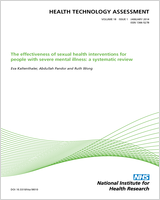NCBI Bookshelf. A service of the National Library of Medicine, National Institutes of Health.
Tappenden P, Carroll C, Hamilton J, et al. Cabozantinib and vandetanib for unresectable locally advanced or metastatic medullary thyroid cancer: a systematic review and economic model. Southampton (UK): NIHR Journals Library; 2019 Feb. (Health Technology Assessment, No. 23.8.)

Cabozantinib and vandetanib for unresectable locally advanced or metastatic medullary thyroid cancer: a systematic review and economic model.
Show detailsThe systematic review of the clinical effectiveness evidence identified two relevant placebo-controlled RCTs: (1) the EXAM trial, which evaluated cabozantinib (n = 330); and (2) the ZETA trial, which evaluated vandetanib (n = 331). The two trials assessed different MTC populations (the ZETA trial inclusion criteria did not specify ‘progressive’ disease), but the ZETA trial did include a subgroup with ‘progressive and symptomatic disease’ (n = 186), which formed the ‘EU-label’ population. This group was considered to be comparable to the EXAM ITT population. Both cabozantinib and vandetanib demonstrated significant benefits compared with placebo in terms of PFS and appear to be broadly similar in terms of efficacy, although neither drug has demonstrated significant OS benefit compared with placebo. Both cabozantinib and vandetanib produced frequent AEs, with substantial proportions of patients experiencing AEs that led to dose interruption or reduction.
Based on the AG’s probabilistic analysis of cabozantinib versus placebo in the EU-label (symptomatic and progressive) MTC population, the ICER for cabozantinib versus BSC is expected to be £150,874 per QALY gained. Within the EU-label (symptomatic and progressive) MTC population of the ZETA trial, the AG’s probabilistic analysis suggests that the ICER for vandetanib versus BSC is expected to be £352,508 per QALY gained. The fully incremental analysis of cabozantinib, vandetanib and BSC based on the EXAM ITT population and the vandetanib PFS treatment effect from the ZETA trial suggests that the ICER for vandetanib versus BSC is expected to be £138,405 per QALY gained, whilst the ICER for cabozantinib versus vandetanib is expected to be £195,593 per QALY gained. Within the fully incremental analysis in which the PFS and OS outcomes for vandetanib were assumed to be equivalent to the cabozantinib group outcomes in the EXAM trial, cabozantinib is expected to be dominated, whilst the ICER for vandetanib versus BSC is expected to be £144,841 per QALY gained. Within the restricted EU-label population (symptomatic and progressive MTC plus CEA/CTN doubling times of ≤ 24 months), the ICER for vandetanib versus BSC is expected to be £66,779 per QALY gained.
The AG’s economic analysis suggests that NICE’s criteria109 for life-extending therapies given at the end of life are not met for cabozantinib in the EU-label population (symptomatic and progressive MTC) or for vandetanib in either the EU-label population or the restricted EU-label population (symptomatic and progressive MTC with CEA/CTN doubling times of ≤ 24 months).
The AG’s economic analysis suggests that the maximum annual budget impact for cabozantinib within the symptomatic and progressive population is expected to be ≈£2.35M. The maximum budget impact for vandetanib within the symptomatic and progressive population is expected to be ≈£5.53M; the costs of vandetanib in the restricted EU-label population are expected to be lower.
Implications for service provision
The implications for service provision are minimal owing to the rarity of the disease and the current availability of both therapies through the CDF.
Suggested research priorities
- Primary research comparing the long-term clinical benefits of cabozantinib and vandetanib within relevant subgroups.
- Analyses of existing evidence from the ZETA trial to investigate the impact of adjusting for open-label vandetanib use using appropriate statistical methods.
- Studies assessing the impact of MTC on HRQoL using a preference-based measure, such as the EuroQol-5 Dimensions (EQ-5D).
- Conclusions - Cabozantinib and vandetanib for unresectable locally advanced or m...Conclusions - Cabozantinib and vandetanib for unresectable locally advanced or metastatic medullary thyroid cancer: a systematic review and economic model
Your browsing activity is empty.
Activity recording is turned off.
See more...